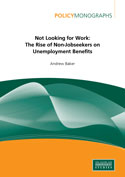
Following the global financial crisis, the incumbent Labor government introduced policies that reduced the job search requirements for people on unemployment benefits. As a result, there are now around 350,000 people receiving unemployment benefits who are classified as ‘non-jobseekers’, meaning that they are not required to look for work.
People on welfare who are not required to look for work will stay on welfare for longer. Furthermore, because people who would otherwise be looking for work are no longer doing so, the government policy change likely had an impact on the unemployment rate in the immediate aftermath of the global financial crisis. The rise of non-jobseekers on unemployment benefits provides a partial explanation for the unusually low unemployment rate following the financial crisis.
Andrew Baker is a Research Fellow at The Centre for Independent Studies.










